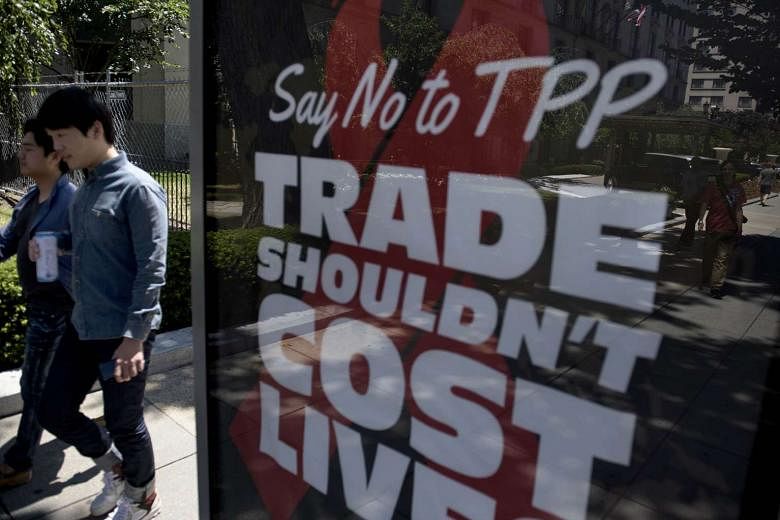WASHINGTON (AFP) - Higher costs for needed generic drugs. Longer copyright protections than the global standard. Foreign investors empowered to overrule governments. A more tightly-regulated Internet.
Those are just some of the potential pitfalls from any deal that could emerge from the Trans-Pacific Partnership, the 12-country free-trade and investment pact shrouded in secrecy as negotiations head into the final stage in Hawaii next week.
A handful of draft chapters of the TPP, leaked via Wikileaks, have highlighted the proposed treaty's heavy emphasis on expanding protections for corporate rights and assets like intellectual property - patents, copyrights and databases - that are far more valuable to advanced economy corporations than traditional cargo trade.
For critics, the proposals show a deal moving more toward protection than free trade, one more about corporate benefits than boosting economies and development.
But backers say the modern global economy needs a new framework of rules to protect intellectual property-dependent 21st century industries that are not covered in traditional free trade pacts like the World Trade Organization.
The 12 countries involved - Australia, Brunei, Canada, Chile, Japan, Malaysia, Mexico, New Zealand, Peru, Singapore, the United States and Vietnam - have agreed to deliberate in great secrecy, with the goal of producing a deal that can either be accepted or rejected as a whole.
The leaked documents, too, show great disagreement on many issues still under negotiation.
Nevertheless, what is known from the leaks has left a whole range of politicians, academics and civil society groups deeply worried.
- Higher drug costs -
Many public health organizations say the intellectual property protections proposed would raise the costs of health care and drugs to many millions around the world.
TPP drafts from last year show a proposed 12-year protection for new biologic drugs, when even the administration of President Barack Obama now wants that US standard reduced to seven years to keep prices lower and foment more competition.
They also show efforts to make it harder for poorer countries to produce generic versions of other drugs, to extend patent protections to new versions of existing drugs and to force governments - particularly New Zealand - to reveal their internal pricing data on pharmaceuticals.
Critics say this will only strengthen the hand of big drug companies.
"The main goal is to lengthen and strengthen current intellectual property regimes via new norms that haven't been included in a trade agreement before," said Judit Rius Sanjuan of Doctors Without Borders.
"As it relates to new regulatory monopolies based on exclusivity, it will delay access to generic medicines," which her group depends on to extend health care to poor people around the world.
"This is a top priority for the US government... to basically change the intellectual property rules of the countries," she said.
Another TPP goal is to enshrine the US-standard of a 70-year copyright protection period, well beyond the 50 years agreed in the 1994 Agreement on Trade-Related Aspects of Intellectual Property Rights.
The Electronic Frontier Foundation, a Silicon Valley lobby on technology-related rights and regulation, said copyright extension only "enriches big media corporations, not struggling artists; it impedes libraries, archives, educators and people with disabilities; and it locks away an entire corpus of works that belong in the public domain."
- More internet controls - EFF has also highlighted another problem with the TPP drafts: an effort to make internet service providers in the 12 countries responsible for enforcing intellectual property rights with their online customers.
The result will likely lead "to more Internet censorship measures... in the name of copyright enforcement," the group said.
Another TPP flashpoint is the controversial investor-state dispute settlement (ISDS), which gives foreign investors the right to sue a government in an outside tribunal over policies or actions that hurt their investment.
ISDS has attracted strong criticism when used, for instance, by powerful companies like Philip Morris to sue Australia over its cigarette packaging rules, Eli Lilly to sue Canada over its drug patent standards and France's Veolia to sue Egypt after it raised wages.
Critics call it a way for foreign investors to overrule a government's domestic policies and laws, at the possible expense of the local population, as well as local companies without the same ISDS recourse.
But defenders note, as the two examples suggest, that ISDS is already widely present in bilateral trade agreements and investment contracts around the world including, for instance, the NAFTA deal covering the US, Canada and Mexico, and the TPP would not substantially change that.

